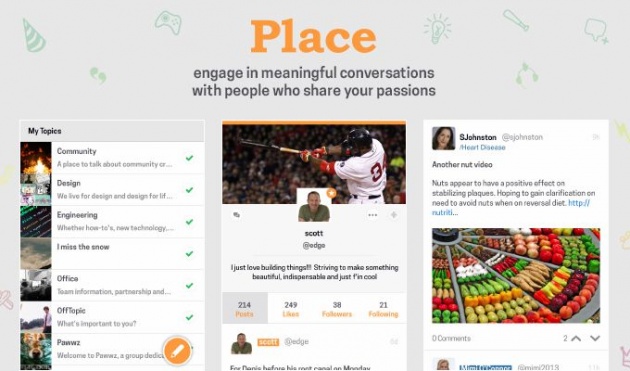
With the burn rate cut in half and leadership squared away, it was time for Backplane to fulfill its destiny. In June 2014 the startup told me it would move away from unscalable social network management for brands, and open up its platform. Yesterday, I got the first outside look at Place, which will launch in a few weeks. It’s now accepting early signups from people who want to start their own communities
Place is somewhere between social network builder Ning and Facebook Groups, but all networks live in the same app, and their creators have full control.
Anyone can start a Place network about anything: A cycling club, a company’s HR team, your family. Each Place offers a Facebook-style feed for sharing text, photos and links, plus topic sub-groups with their own streams.
But what’s special about Place is that admins can bend or break the rules, and peer into the backend. Harrison said that Backplane built a slew of internal management and analytics tools, “and now we’re going to give them away.”
Place admins get freedoms Facebook doesn’t offer.
They can establish their own branding so you’ll never see a Place logo, and choose their own URL. Admins can check how many posts were shared, exactly who saw them, who are the most active users, and total viewership, not just engagement. Networks can be set up so only some people can post, and everyone else can only lurk or comment, unlocking Places where fans and celebrities interact without it devolving into chaos.

“We’re trying to create this world where your social life is not about being part of the crowd,” said Harrison. “We don’t have one face. We have many faces. We’re trying to let you express yourself very differently in different Places.” For some, Place could be a professional collaboration tool like Slack or Yammer. It could emerge as a promotional tool for artists or businesses. And still others will create mini-Facebooks for people like them.
Unlike its original, monolithic branded social networks, all these communities live inside the Place app and you can instantly jump back and forth between them. That lets you express prismatic identity, where you share different sides of yourself to different networks. Much like in real life, you can present a more polished personality in professional Places, but let your hair down with friends or geek out with fellow hobbyists.



